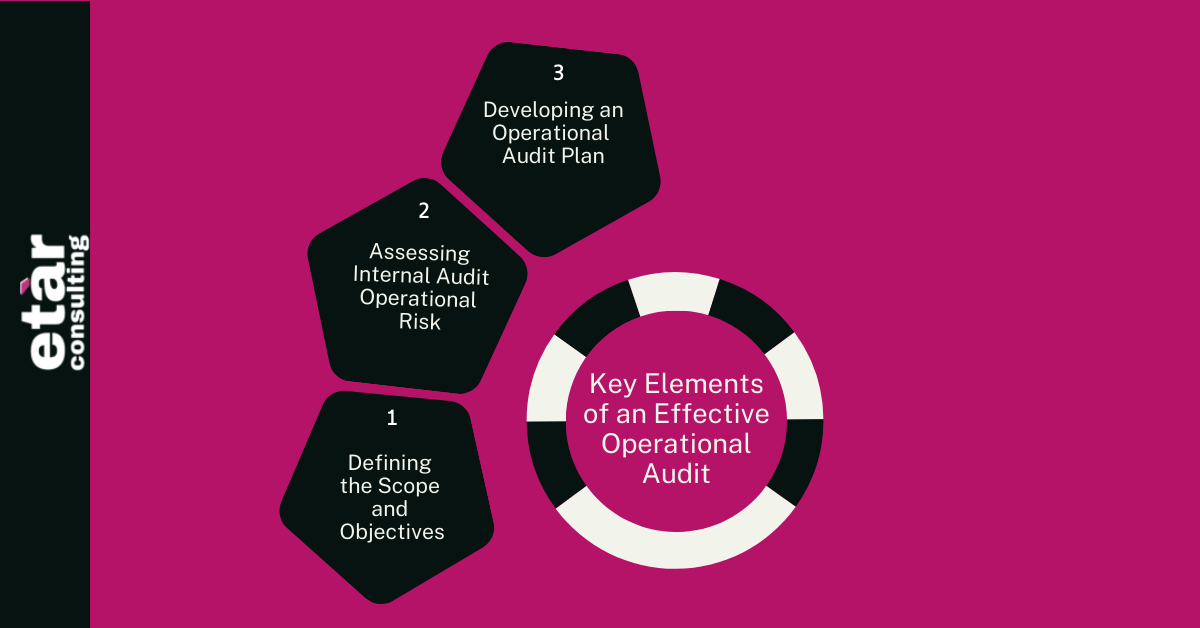
Introduction
A well-executed operational audit is essential for businesses aiming to optimize their workflows, minimize risks, and improve overall performance. Unlike financial audits that focus on monetary transactions, operational audits assess business efficiency, internal controls, and compliance with best practices.
By implementing strategic audit processes, organizations can enhance productivity, cut unnecessary costs, and ensure that their operations align with industry standards.
In this guide, we’ll explore expert operational audit tips to help businesses streamline their processes and improve efficiency.
Key Elements of an Effective Operational Audit

Defining the Scope and Objectives
A successful business operations audit starts with a clear understanding of the scope and objectives. Businesses must determine which areas require assessment, whether it’s workflow efficiency, compliance, or cost optimization. Setting clear goals ensures a focused and effective audit process.
Assessing Internal Audit Operational Risk
Every business faces risks that can impact efficiency and profitability. An internal audit operational risk assessment helps identify vulnerabilities in business processes, supply chains, and employee productivity. By addressing these risks proactively, businesses can prevent costly disruptions and enhance operational stability.
Developing an Operational Audit Plan
A well-structured operational audit plan serves as a roadmap for the audit process. It outlines key areas of evaluation, timelines, audit methodologies, and responsibilities. A comprehensive audit plan ensures consistency and accuracy in identifying inefficiencies and areas for improvement.
Best Practices for Conducting Operational Audits
Collecting and Analyzing Data
Accurate data collection is the foundation of a successful audit. Businesses should use performance metrics, employee feedback, and workflow documentation to assess their operational strengths and weaknesses. Reliable data helps in making informed decisions and implementing necessary changes.
Identifying Inefficiencies and Weaknesses
Operational audits reveal process inefficiencies that may be affecting business performance. These can include redundant workflows, ineffective communication channels, or outdated technologies. Once identified, businesses can take steps to streamline their operations and improve efficiency.
Implementing Corrective Measures
The insights gained from an audit should lead to actionable improvements. Companies must ensure that corrective measures are effectively communicated to employees and integrated into daily operations. Regular follow-ups help in tracking progress and maintaining efficiency.
Challenges in Operational Audits and How to Overcome Them
Resistance to Change
Employees often resist changes brought about by audits due to fear of additional workload or job insecurity. To overcome this, businesses should engage employees in the audit process and emphasize the benefits of improved efficiency and streamlined workflows.
Lack of Clear Performance Metrics
Without measurable benchmarks, businesses may struggle to evaluate operational success. Setting clear business operations audit KPIs ensures objective and structured assessments, allowing companies to track progress effectively.
Inaccurate or Incomplete Data
Unreliable data can lead to misleading audit results. Businesses should invest in proper documentation systems and ensure accurate data collection methods to enhance audit effectiveness.
Benefits of Operational Audits in Business Growth
Cost Reduction Strategies
Audits help businesses identify unnecessary expenses and inefficiencies in resource allocation. By cutting wasteful spending, companies can reinvest in areas that drive growth and profitability.
Improved Workflow Efficiency
Operational audits streamline business processes by eliminating redundancies and optimizing workflows. This leads to faster decision-making and increased productivity.
Enhanced Risk Management
With a strong focus on internal audit operational risk, businesses can mitigate potential threats before they become major issues. Proactive risk management ensures long-term sustainability and operational resilience.
ETAR Consulting: Your Partner in Operational Audits
ETAR CONSULTING (Member of Integra International) is a trusted consulting firm based in Amman, Jordan, specializing in business operations audit, risk assessment, external and internal audits, and management consulting. Their expertise helps businesses optimize their operational efficiency, enhance compliance, and implement best practices.
With tailored audit strategies, ETAR Consulting ensures that companies achieve sustainable growth, minimize risks, and maintain high operational standards.
Explore more Internal Audit Tips for Business Growth
| Internal Audit | Tips |
| – Importance of internal audit training – Best practices for training auditors – How to develop audit skills effectively | |
| – Understanding risk-based audit approach – Developing a risk-based audit plan – Improving risk management strategies | |
| – Essential technical and communication skills – Competencies of an effective auditor – How to improve audit efficiency | |
| – Enhancing business operations through audits – Key steps for a successful operational audit – Improving internal control efficiency | |
| – Importance of risk assessment in internal controls – Key risk assessment procedures – How to strengthen risk management frameworks |
Conclusion

A well-executed operational audit is a powerful tool for businesses looking to enhance efficiency, reduce costs, and improve compliance. By following structured operational audit plan guidelines and addressing internal audit operational risk, companies can optimize their processes and drive long-term success.
Partnering with experts like ETAR Consulting ensures a comprehensive audit approach that delivers measurable improvements. Implementing best practices in business operations audit is not just about compliance—it’s about building a more efficient, productive, and resilient organization.
Frequently Asked Questions (FAQs)
1. What is an operational audit?
An operational audit is a detailed assessment of a company’s business processes, workflows, and internal controls to improve efficiency and ensure compliance with best practices.
2. How often should businesses conduct operational audits?
Businesses should conduct operational audits annually or whenever significant process changes occur to maintain efficiency and compliance.
3. What are the key areas evaluated in an operational audit?
Key areas include workflow efficiency, cost management, risk assessment, compliance, and overall operational performance.
4. How can businesses overcome employee resistance to operational audits?
Engaging employees in the audit process, explaining the benefits, and offering training can help reduce resistance and improve implementation.
5. Why should businesses partner with ETAR Consulting for operational audits?
ETAR Consulting provides expert guidance, risk assessment, and customized audit solutions to help businesses optimize their operations and achieve sustainable growth.

